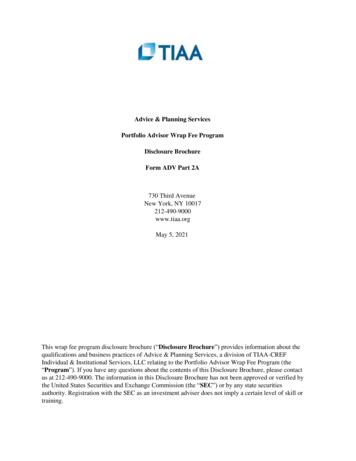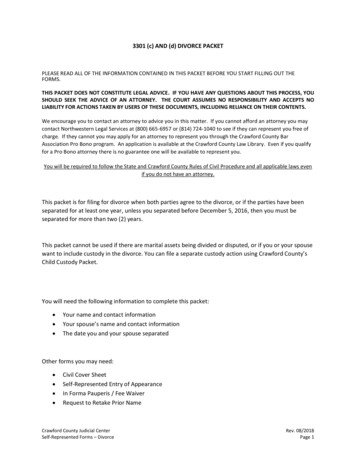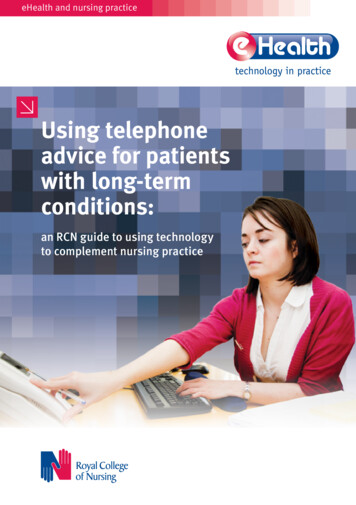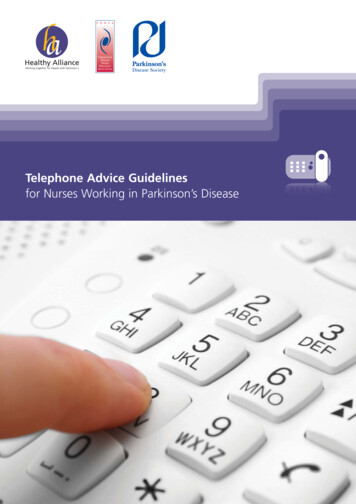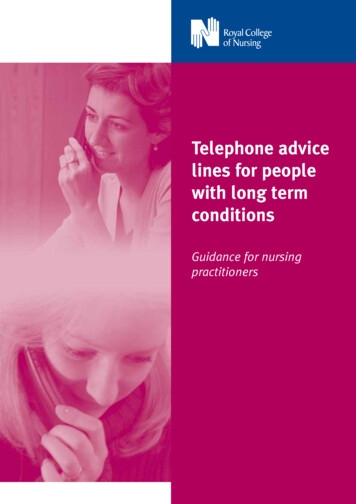
Transcription
Mitch’s Uncensored Advicefor Applying to Graduate Schoolin Clinical PsychologyRevised 2021Thanks are due to many undergraduate and graduate students for their exceptionally usefulfeedback on this document, and their endless supply of excellent questions that I have attemptedto address.Extra thanks are due to former graduate students Drs. Sophie Choukas-Bradley, CarolineAdelman, and Whitney Guerry, and John Guerry, for their input on the Interview section,including sample questions to ask/be asked.Good luck to everyone!-Mitch Prinstein, Ph.D., ABPP
Mitch’s Advice for Applying to Grad SchoolPage 2Applying to Graduate School in Clinical PsychologyIntroduction. Applying to Graduate School in Clinical PsychologySection 1. Do You Really Want to be a Clinical Psychologist?Social WorkCounselingMarriage and Family TherapySchool PsychologyMasters in General PsychologyCounseling PsychologyDevelopmental, Social, Cognitive Psychology, and NeurosciencePsychiatryClinical PsychologyResearch and Clinical Work in Clinical PsychologyClinical Child and Adolescent PsychologyClinical Adult PsychologyClinical Health Psychology and Pediatric PsychologyPh.D. vs Psy.D.To Postbacc or not to Postbacc?Section 2. Applying to Doctoral Ph.D. Programs in Clinical PsychologyObtaining Research ExperienceObtaining Clinical ExperienceHow the Admissions Process WorksEducational BackgroundGeneral Match to Program Values and Training ExperiencesSpecific Match to a Mentor and Research ProgramThe Personal StatementThe Diversity StatementContacting Potential Mentors: Sometimes a Good IdeaSection 3. I Just Got an Interview for a Clinical Psychology Doctoral ProgramWhat do I do?!Scheduling the InterviewsWhat if I am Applying During a Worldwide Pandemic?What Will Happen During These Interviews?Questions To Ask Potential AdvisorsQuestions To Ask Graduate StudentsTalking About ResearchStructured InterviewsQuestions You May be AskedOther InterviewsOther FactorsHow to Make Your Decision
Mitch’s Advice for Applying to Grad SchoolPage 3Section 4. Frequently Asked QuestionsAbout the FieldAbout the Application Process
Mitch’s Advice for Applying to Grad SchoolPage 4Applying to Graduate Schools in Clinical PsychologyIntroductionPsychology is the most popular major on many college campuses. Each year, thousands ofstudents apply to graduate schools with hopes of pursuing a career in mental health science orpractice. Yet, as compared to other types of graduate programs (e.g., law, medicine), remarkablylittle information is available to help students determine the career path that offers the best matchto their interests. Specific practical advice on how to successfully navigate the applicationprocess also is lacking.This brief guide is designed to provide an overview of different types of possible career optionsin the mental health industry, as well as specific information about the application process for acommon option: the clinical psychology doctoral (Ph.D.) program. Since posting the firstversion of this document over 15 years ago, I am thrilled that it has been a useful resource for somany people interested in this field that I love. The widespread dissemination of this documenthas exceeded even my wildest hopes for helping students and trainees. Now it is time to offerthis update to reflect the ever-changing field of clinical psychology, and hopefully help a newgeneration of students.But before we begin, I should offer an important disclaimer here. The text below simplyrepresents my opinions and impressions of the current state of the field, and of the applicationprocess for clinical Ph.D. programs. In no way should this informal advice be used to replaceactual data or specific information provided by professional organizations in the mental healthfield, individual doctoral programs, or even advice from other professionals. I feel best preparedto comment on Ph.D. programs in clinical psychology that subscribe to the scientist-practitioneror clinical science models of training. My experience exclusively is with the admissionsprocesses and training goals of these types of programs, and I cannot speak directly to programsthat have adopted distinctly different training models. However, because so little information isavailable to students interested in mental health careers, I have offered some general opinionsand impressions below that I hope will be beneficial, if used in the proper context. In manyplaces, I have offered some hyperlinks to websites that can provide more detailed information.
Mitch’s Advice for Applying to Grad SchoolPage 5Section 1Do You Really Want to be a Clinical Psychologist?When students ask me for professional development advice regarding graduate school, theyusually have already determined that they would like to apply to doctoral programs in clinicalpsychology. This is usually based on students’ general desire to work as a therapist, perhaps in ahospital or a private practice type of setting (e.g., a home office or group practice). Sometimes,students will state an interest in research. Other times, students might indicate that they aresomewhat afraid of statistics and “turned off” by the idea of writing a dissertation.I would say that this impression of the field of clinical psychology, and of the training activitiesincluded during graduate school, is somewhat accurate, but in some ways quite inaccurate. Yet,an accurate and thorough description of the field of clinical psychology is somewhat difficult toarticulate because the field is changing quite dramatically and quickly. Nevertheless, I think it isimportant to briefly reconsider what your career goals are (or at least what you are not interestedin) before talking about graduate applications.Let’s assume that you know that you are intrigued by the mental health field. Actually, there areat least nine different mental health fields and three different graduate degrees available to you topursue these interests. The differences between these fields and degrees are quite dramatic.Each involves somewhat different training expectations and opportunities as well as differenttypes of career activities. Interested in research? Teaching? Practicing (e.g., offering therapy or conductingassessments)? Consulting? Mentoring students? Working with young children?Adolescents? Adults? The elderly?Do you want to work in a hospital? A university? A teaching college? An elementary orsecondary school? A business corporation? The government? A VA? A non-profit?Who will your colleagues be? What kind of job stability do you want? What salary? Aconsistent salary or one based on billable hours?How many years are you willing to dedicate toward training? Are you willing to move,perhaps several times, in order to complete all aspects of training?Not sure yet? Keep reading for more details about which options may be a good match. Youalso can look this webpage from the American Psychological Association: or a profile ofpsychology-related careers on my own site profiling about 30 different ways that people usedtheir psychology major (note: see their job titles by using the bookmarks tab within thedocument).Below, I will offer some brief descriptions (and links) to discuss nine fields below. I urge younot to just skip to the discussion of clinical psychology at the end. You may be surprised to learnwhere points of overlap and divergence exist between each of the fields below. Thisunderstanding also will be crucial for your successful application to any mental healthprofession. No matter type of degree you pursue, it will be important to articulate your interests,and how your chosen profession matches with what you hope to accomplish in your career.
Mitch’s Advice for Applying to Grad SchoolPage 6One quick note before you begin reading about each of these nine areas, however, and that has todo with what’s referred to as “evidence-based practice.” This will be discussed in much moredetail below, but for now it is important to note that there are many types of therapy - over 500different approaches available to help ameliorate mental illness and promote psychological wellbeing. Some of these have been rigorously examined in scientific research, and some have not.This is very important for you, your career, and the health of all of your future patients. If thetherapy you offer is based on a clear scientific understanding of the factors that promote ormaintain mental illness, and specifically addresses these factors, there is a good chance that thetherapy will work. Even more important, if the approach to therapy you use has been tested inrandomized clinical trials, yielding proof that it causally predicts a drop in mental healthsymptoms, then we can say with great confidence that the therapy has a terrific chance of helpingpatients ease their suffering.But if the therapy addresses something that we don’t know has any relation to psychopathologyat all, or if there is no evidence that the therapy reduces symptoms as compared to a placebo oror control, and then you may be just wasting your, and your patients’ time. For instance, manystudents may have heard of “music therapy,” or “art therapy,” or even approaches to therapy thatinvolve ‘energy waves,’ ‘rebirthing’ experiences, the use of non-directed play to work through‘unconscious psychological conflicts,’ or hundreds of other suspect techniques. Approaches likethese may have fervent fan bases and even testimonials from patients who believed they wereuseful. They may even offer some short-term relief from a bad mood. But there is simply noconsistent scientific evidence to suggest that they will help reduce the kinds of psychologicalsymptoms we may see in the DSM, and certainly these approaches will not be better than“evidence-based treatment.” (See https://www.div12.org/psychological-treatments/ andwww.effectivechildtherapy.org for more info on evidence-based treatments for adults and youth,respectively).If you have chosen to dedicate your professional life to reduce the burden of mental illness, youare probably especially interested in a career that will be as helpful as it can be. Be sure to attendto the issue of evidence-based treatment as you consider the nine fields below.In the few pages that follow within this section, I will review:1) Social Work (Masters or Doctorate)2) Counseling (Masters)3) Marriage and Family Therapy (Masters)4) School psychology (Masters or Doctoral degree)5) Masters in General Psychology6) Counseling psychology (Doctoral degree)7) Developmental, Social Cognitive psychology (Doctoral degree)8) Psychiatry (Medical degree)9) Clinical psychology (including clinical child psychology, clinical adult psychology, andclinical health and pediatric psychology) (Doctoral degree)For doctoral degrees, I also will offer some comments on the choice between a Ph.D. degree anda Psy.D. degree.
Mitch’s Advice for Applying to Grad SchoolPage 7You should know that there is not an equal proportion of these different types of professionals inthe United States. In fact, of all mental health professionals, about three out of every four aresocial workers, mental health counselors, or marriage and family therapists. Only 15% or so ofmental health providers are psychologists.Social WorkWhat do Social Workers do?The Masters in Social Work (MSW) is a very versatile degree. Social workers can be involved inmany different types of careers and in many different types of settings. I recommend a visit tothe website of the National Association of Social Workers for an excellent description of thefield. As you will see on this website, some social workers become involved in advocacy orpolicy settings. Others become licensed clinical social workers and are able to provide therapyto clients, in ways that can be remarkably similar to the practice of a doctoral level psychologist.Clinically-trained social workers may include: Social Caseworkers (case management, assessingneeds and applying agency services and resources to address social, health or economicproblems); Medical Social Workers (work with the special needs of patients and families inhospitals, long term care facilities, and other medical care facilities); School Social Workers(help with emotional, social and economic problems so students can focus on getting aneducation); Clinical Social Workers (found in private practice or in psychiatric & mental healthcare settings, or employee assistance programs within larger companies, where they providepsychotherapy and counseling); Administration and Management (social workers oversee theprograms and systems that provide social, health and public welfare services); CommunityOrganization social workers work in cooperation with the community to identify needs and todevelop or improve services and systems to meet those needs; Social Policy and Research(analyze social problems, design and conduct in depth research studies and develop ways forsocial programs and systems to overcome those problems).What is the training like?Although you can obtain a doctorate in social work (DSW or Ph.D), it is completely possible tobe an autonomous, practicing social worker with a master’s degree. With only two years ofschooling (plus an internship), it also can be a quick way to get into the workforce. Mastersprograms generally can accept a much higher proportion of applicants for admission thandoctoral programs; thus, it is somewhat easier gain admission if going this route. Many socialwork graduate programs offer some training in evidence-based practice, but this variesconsiderably from program to program. This is important to look into further when determiningwhich social work programs you want to apply to.CounselingWhat do Counselors do?Admittedly, I do not know much about the field of mental health counseling beyond what onecan learn from professional websites, such as the site for the American Counseling Association.The distinction between mental health counseling and other mental health fields may be lost onthe general public as well. Even a casual look at “Find a Therapist” directories on sites such asPsychology Today reveals many who identify themselves as mental health counselors, yet theireducation and effectiveness as mental health providers is relatively unknown, at least to me. TheAmerican Counseling Association indicates that counselors may have focused expertise in
Mitch’s Advice for Applying to Grad SchoolPage 8addictions, career counseling, clinical mental health or community agency counseling, marriage,couples and families, school counseling, student affairs and college counseling, gerontology, orcounselor education and supervision.What is the training like?A counselor is eligible to practice after receiving a master’s degree, typically in about 2 years.There are many programs nationally to obtain this type of degree, and relatively few of thempromote training in evidence-based practice. However, this may be changing.Marriage and Family Therapy.What do Marriage and Family Therapists do?Marriage and family therapists treat psychological disorders by considering the couple or thefamily as a system, or a unit that should be treated conjointly. The American Association forMarriage and Family Therapy reports that most MFTs conduct brief therapy, usually under 20sessions. MFT typically includes an approach to therapy that relies on family systems theory,which has some limited support as an evidence-based approach.What is the training like?One may obtain a masters or a doctorate in marriage and family therapy, although the master’s issufficient for independent practice. Given the nature of the discipline, training in evidence-basedtherapy delivered to individual patients is rarely available within MFT graduate programs.School PsychologyWhat do School Psychologists do?The National Association of School Psychologists (NASP) has a great website to describe thefield, the roles (and even salaries) of school psychologists. School psychologists generally arefocused on helping children succeed in the school setting, both academically and emotionally.Most work in a school setting. Their work can involve individual consultation with children andfamilies, designing programs to assist teachers with specialized classroom instruction needs, andprogram development to help train basic skills like anger management and social skills. In theseways, school psychologists are kind of like the ambassadors of psychology in a school setting.When a child is experiencing difficulties, if there is a crisis in the school (e.g., trauma, death), ifadministrators are setting policy that will affect children’s educational lives, school psychologistsare there to ensure that psychological well-being is maintained and to help educate otherprofessionals on children’s psychological needs or limitations.A major task for many school psychologists also is to conduct assessments of children’sacademic and social-emotional functioning. Every child who may be eligible for giftednessplacement, or for learning disability (LD) services, needs to be evaluated using standardizedassessments. School psychologists typically are the only professionals within the school settingwith the training to administer and interpret these types of standardized assessments. LDevaluations in particular have important implications not only for children, but also for schoolpolicy and funding. Public law mandates that children receive the services they need to obtainan adequate education, and each child meeting LD criteria must have an individualizededucational plan developed, and evaluated periodically. School psychologists often serve thelead role in this endeavor.
Mitch’s Advice for Applying to Grad SchoolPage 9What is the training like?You may have heard that to practice as a “psychologist,” you must have a doctoral degree. Thatis true for all fields except school psychology. School psychologists can be hired with only amaster’s degree (plus year-long internship). This may be, in part, because there is a tremendousshortage of school psychologists working in the US, and the field is reducing barriers to gettingnew, bright students into the profession! Keep in mind that master’s-level School Psychologistsare not able to practice autonomously, however, but they can be hired and even tenured within apublic school system (e.g., elementary, middle, or high school).Masters in General PsychologyWhat is the Masters in General Psychology?There are not too many terminal masters programs in psychology, but those that exist offer a niceoption for students who wish to gain advanced experience in psychology before pursuing adoctoral degree. Each masters program varies in its training goals. However, many offergraduate coursework and require the completion of a master’s thesis to obtain a degree.Programs typically last 1-2 years.There are benefits and drawbacks to the terminal master’s degree. The good news is that this isan opportunity for structured education in psychology. The coursework is taught at the graduatelevel and may even include some specialty work (e.g., training in clinical psychologyspecifically). The master’s thesis also offers an opportunity to learn more about psychologicalresearch. Students who did not major in psychology during their undergrad years, or who feellike their interests are not yet well-developed, may find this structured educational opportunityenormously helpful.Unfortunately, the terminal master’s degree in itself does not offer many career options. Itshould be noted that many doctoral programs in psychology offer a masters degree en route tothe doctoral degree. Thus, within the 4-6 years of doctoral training, a master’s thesis may berequired, and the degree will be granted – somewhat marking the half-way point of doctoraltraining. The terminal master’s degree is different. Many students in terminal masters programsgo on to a doctoral program. Some of these doctoral programs will credit the time in
4) School psychology (Masters or Doctoral degree) 5) Masters in General Psychology 6) Counseling psychology (Doctoral degree) 7) Developmental, Social Cognitive psychology (Doctoral degree) 8) Psychiatry (Medical degree) 9) Clinical psychology (including clinical child psychology






